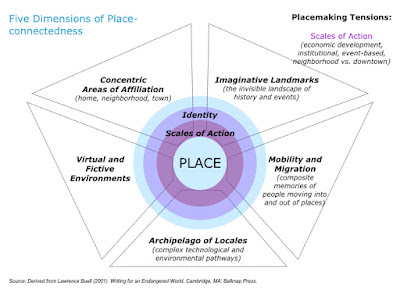While I still believe that these interests are not mutually exclusive, the struggle between local economic development and local understandings of place continues everywhere. When site-specific projects at the neighbourhood scale have clear objectives to address the history and culture of neighbourhood, through historic preservation or cultural programming for example, there can be a common narrative derived from community input. To overlay development without an understanding of place identity is a missed opportunity.
One thing is clear. The image I derived from Lawrence Buell's concepts of place-connectedness suggests that the overlay of digital information, which in 2007 was barely a whisper, is now in full swing and largely accessible. If communities don't step up to develop the content that delivers their narrative, then it will be filled in for them.

No comments:
Post a Comment